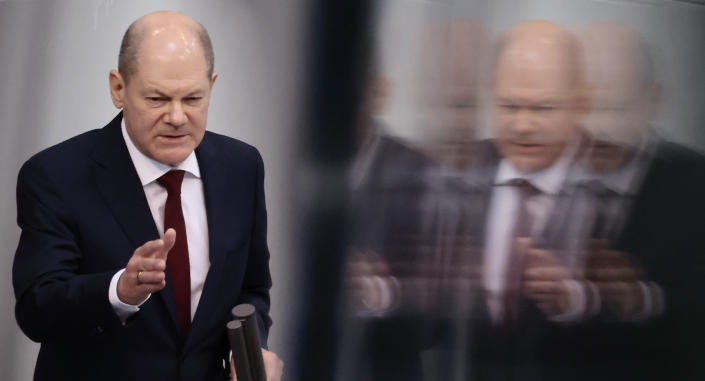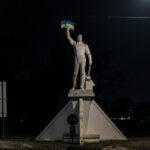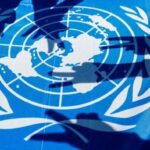Since launching an invasion into Ukraine last week, Russian President Vladimir Putin and his country have faced intense backlash from the world, ranging from sports and culture to crippling economic sanctions.
The backlash has even included countries thought to be in Putin’s orbit, as well as nations that have prized themselves for decades as being above the fray. Other states have taken unprecedented steps to deliver aid to Ukraine. And the reactions have come swiftly, surprising many observers unused to this level of international unity.
The punishments have already had a severe impact on Russia’s economy, sparking a financial meltdown as the ruble collapsed in value.
Here’s a list of some of the reactions to Moscow’s attack.
European Union
The EU has taken comprehensive action against Russia, including the unprecedented action of sending $500 million in military aid. The group is also freezing the assets of Putin and other Russian officials, as well as freezing roughly half of the country’s foreign currency reserves. They are also targeting Belarus and its president, Alexander Lukashenko, who is allowing his country to be a military base for the assault.
On Saturday, the U.S., Canada, the United Kingdom and the EU announced they were partially removing Russia from the SWIFT financial messaging system that handles billions in transactions daily. BP said it was exiting its $14 billion stake in the Russian state oil company Rosneft, reportedly after pressure from the British government. Additionally, the EU said that it would be banning Russia Today, Sputnik and their Russian state media affiliates from the airwaves so they will “no longer be able to spread their lies to justify Putin’s war.”
German Chancellor Olaf Scholz said in a speech Sunday that Germany would be increasing their defense budget in response to the invasion, calling it a “a turning point in the history of our continent” and adding, “it is clear that we need to invest significantly more in the security of our country.” Scholz had already announced last week that his country was halting certification of the Nord Stream 2 gas pipeline.
Far-right Hungarian Prime Minister Viktor Orbán, considered an ally of Putin, announced that his country would not block any of the EU sanctions against Russia. This represents a notable departure for Orbán, who met with Putin in Moscow on Feb. 1, and said afterward that Russia’s security concerns were reasonable and sanctions against the nation were pointless and “doomed to failure.”
Hungary, which borders Ukraine, is also bracing for a flow of refugees fleeing the war.
United States
The U.S. announced it was targeting Russia’s banks, oligarchs close to Putin and Putin himself.
“Some of the most powerful impacts of our actions will come over time, as we squeeze Russia’s access to finance and technology for strategic sectors of its economy and degrade its industrial capacity for years to come,” Biden said last week.
“We’ll strike a blow to their ability to continue to modernize their military. It’ll degrade their space industry, including their space program. It’ll hurt their ability to build ships, reducing their ability to compete economically. And it will be a major hit to Putin’s long-term strategic ambitions,” Biden continued.
The U.S. has also been pushing other countries to take similarly harsh measures.
Switzerland
One of the latest and most notable reactions to the invasion is that Switzerland has chosen a side. On Monday, the famously neutral country said it would adopt European Union sanctions against Moscow and freeze Russian assets located in the country’s banks. In addition, the government adopted sanctions specifically against Putin, Prime Minister Mikhail Mishustin and Foreign Minister Sergey Lavrov.
“In view of Russia’s continuing military intervention in Ukraine, the Federal Council took the decision on February 28 to adopt the packages of sanctions imposed by the EU on February 23 and 25,” the government said in a statement.
Finland and Sweden considering NATO
The two nations that border Russia were threatened with “serious military-political consequences” by Moscow if they were to join NATO, but both of them brushed off the threats. Finnish Foreign Minister Pekka Haavisto said “we’ve heard this before” and “don’t think that it calls for a military threat.” Finland’s 830-mile border with Russia is the longest of any European Union country.
“I want to be extremely clear: It is Sweden that itself and independently decides on our security policy line,” Swedish Prime Minister Magdalena Andersson said in a statement, responding to Russian allegations that the U.S. and its allies were attempting to “drag” the nation into joining.
The development is significant as one of Russia’s chief stated aims before the war was preventing NATO’s eastward expansion towards its borders. Any growth in the military alliance would be a blow to the Kremlin’s underlying security interests in the region.
Asia
Japan, South Korea and Taiwan are among the nations to announce their support of Ukraine and condemnation of Russia. Japanese Prime Minister Fumio Kushida said they would join in freezing transactions from Russia’s central bank and limiting exports, as well as pledging $100 million in humanitarian aid to Ukraine.
“I told [Ukrainian President Volodymyr Zelensky] that Japan is with Ukraine… and offered firm support for Ukraine’s sovereignty and territorial integrity,” Kishida said.
South Korea announced it would also be blocking strategic exports — potentially including electronics, semiconductors and computers — as well as helping to limit Russia’s access to the SWIFT system. Taiwan said it would be joining in the sanctions and that its computer chip companies would be complying.
Airspace ban
Russian aircraft have been banned from flying over the entire European Union, a move taken over the weekend by all 27 countries.
“We are shutting down the EU airspace for Russian-owned, Russian-registered or Russian-controlled aircraft,” said European Commission President Ursula von der Leyen. “They won’t be able to land in, take off or overfly the territory of the EU. Including the private jets of oligarchs.”
Canada has announced similar measures. On Sunday, Transportation Minister Omar Alghabara said, “All of Canada is united in its outrage of President Putin’s aggression against Ukraine.”
Eurovision
The annual song contest featuring representatives from across the region said that Russia would not be allowed to compete in the popular show, which boasts of over 180 million viewers. The announcement came after a Ukrainian petition and general blowback in response to the competition’s initial decision to allow Russia to remain in the field.
“The European Broadcasting Union has announced that no Russian act will participate in this year’s Eurovision Song Contest,” the organization said in a statement. “The decision reflects concern that, in light of the unprecedented crisis in Ukraine, the inclusion of a Russian entry in this year’s Contest would bring the competition into disrepute.”
This year’s event is scheduled to be held in May in Turin, Italy. The rap group Kalush Orchestra will represent Ukraine.
Russian Grand Prix
Formula One has canceled its race scheduled for Sochi in September. After initially stating it was “watching the developments,” the association changed course last week, stating it was “impossible to hold the Russian Grand Prix in the current circumstances.” Prior to the announcement, drivers were already stating they would boycott the contest.
“No, I would not have wanted to go,” said British driver Lando Norris. “Out of pure respect for what’s going on. There is no reason we should be able to live our lives normally and go and have a normal race in a country where those things are going on.”
Soccer
FIFA announced Monday that it was issuing an indefinite ban against Russia’s teams, including removing them from the 2022 World Cup field. The move came a day after the organization issued much lighter sanctions against the nation, resulting in severe criticism that it did not go far enough.
Additionally, the title game of the Champions League soccer tournament was set to be held in St. Petersburg in May, but UEFA announced Friday that the event was moving to Paris after holding an “extraordinary meeting following the grave escalation of the security situation in Europe.” The organization is also looking to end a massive sponsorship deal with Gazprom, a state-owned Russian energy company.
Cover Thumbnail Photo: Sergei Guneyev\TASS via Getty Images




